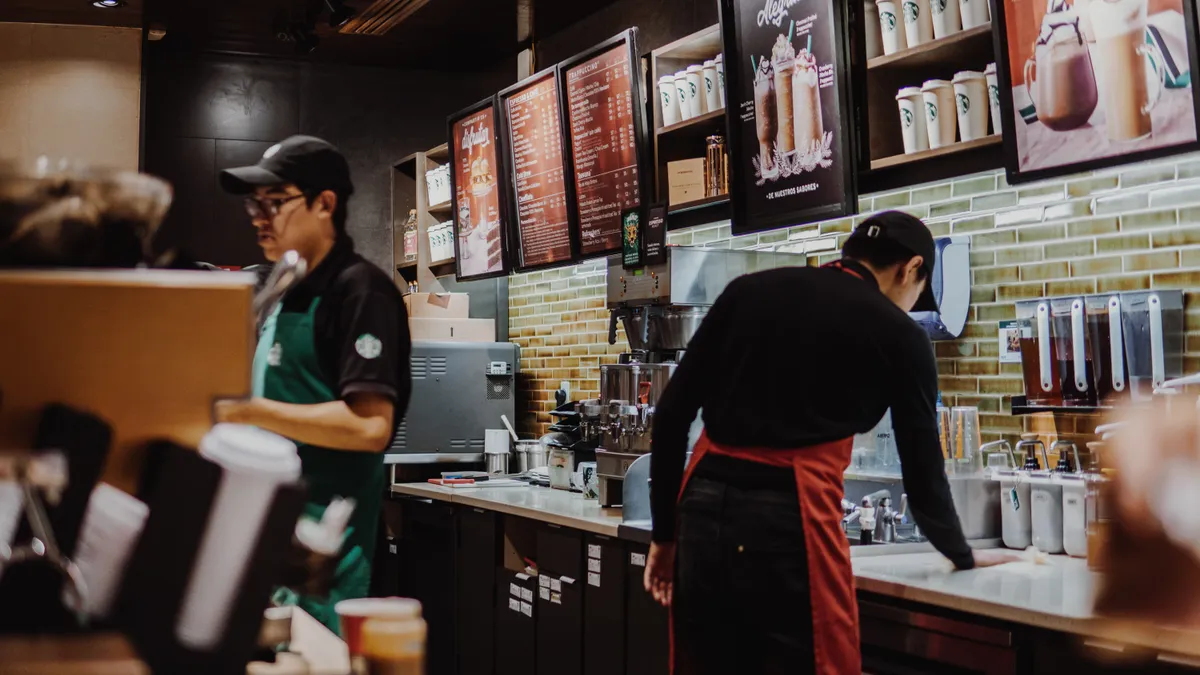NEW YORK — As the voices decrying mobile's negative impacts on people and society grow louder, Starbucks President and CEO Kevin Johnson yesterday urged an audience at the National Retail Federation's Big Show not to be afraid of reinventing the future through technology, but insisted innovation must come with a focus on fostering human interaction.
Community is ingrained in Starbucks, which was inspired by founder Howard Schultz's visits to lively espresso bars in Italy, said Stephanie Mehta, Fast Company editor-in-chief and moderator of the session "Nurturing humanity in modern-day retail." As one of the pioneers of leveraging mobile to enhance customer experiences through loyalty, payments and order-ahead tools, Starbucks also understands that sometimes customers just want to quickly pick up their order and get on their way.
"We have to boldly reinvent the future," Johnson said. "If mobile internet has created these new scenarios, we embrace that, but we don't do it at the expense of human connection."
A balanced brew
With the Starbucks brand's 50th anniversary coming up in 2021, the company is considering what will ensure it earns the right to celebrate its centennial in another five decades, and sees digital technology continuing to play a crucial role, said Johnson, who worked at IBM and Microsoft early in his career.
A new innovation lab modeled after Silicon Valley has helped accelerate the pace of innovation. At the same time, the company has embraced human-centered design, which looks at how new ideas will impact employees and customers, ensuring human connection remains top of mind.
Deep Brew, Starbucks' artificial intelligence (AI) technology, is a key part of the company's vision for the future. Currently, the tech calculates a store's inventory needs and predicts how many baristas are needed every day. The benefit is that Starbucks employees don’t have to spend time doing these tasks, meaning they have more time to spend on helping and interacting with customers. According to Johnson, 100% of the time saved through AI goes back into customer connections.
"It's about finding ways to help humans find more time to be human," Johnson said. "It's not about robots that replace baristas. It's about tech that frees up baristas to be better and connect with customers."
"It's not about robots that replace baristas. It's about tech that frees up baristas to be better and connect with customers."

Kevin Johnson
Starbucks, president and CEO
The chain is also experimenting with some advancements to its AI tech that would eliminate the need for baristas to look down and away from customers as they input orders. Instead, employees might have a microphone and the AI would parse out conversations with customers and understand orders.
"That eye contact and that conversation is a much better connection with a human being than typing in the order," Johnson said. "We are trying to invest in those things that we know will enable our partners to spend more time connecting with customers."
So far, the results from Deep Brew are promising, with Johnson reporting that Starbucks' customer connection scores hit an all-time high and sales are growing.
"There's a direction linkage there between human interaction, serving the customer, building the relationship and the frequency and engagement that we have with our customer," he said.
Uplifting work
The company's vision around Deep Brew has also enabled Starbucks to recruit some of the best talent in technology, the executive noted. The chain is even attracting some prospective candidates who, in the past, might have wanted to work at one of the tech giants. With these companies facing an image crisis stemming from business practices viewed as putting profits over people, some candidates are looking for companies with a different kind of reputation.
"Over the next 10 years, we want to be as good at AI as the tech giants," Johnson said. "It is a human-first digital strategy. With that vision, there is a lot of great talent that wants to come contribute to it because they see it can impact on humanity and has massive reach. We can affect positive change on the world."















